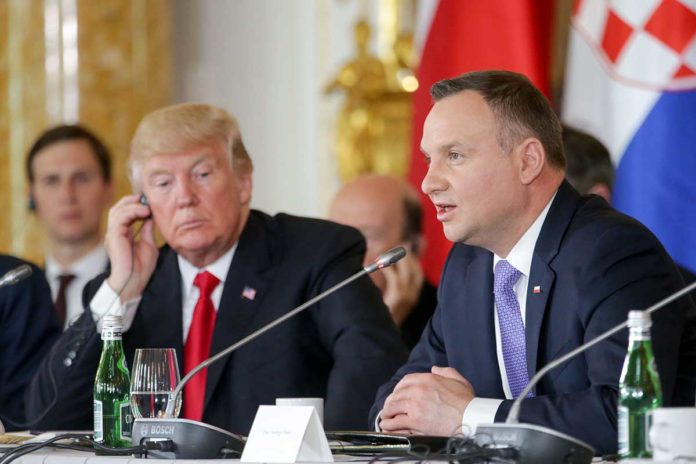Poland is the world hotspot for homophobia right now, with near-daily incidents of anti-gay actions, some of which have resulted in LGBT+ activists being arrested. LGBT+ rights advocates attribute the uptick in anti-LGBT actions and harassment to the re-election of the far-right president, Andrzej Duda, who espouses strongly anti-LGBT rhetoric and policy. Duda was first elected in 2015 and has grown increasingly more repressive against LGBT+ people over his tenure.
Duda won the July 13 presidential election on an overtly anti-LGBT+ platform shared by his far-right Law and Justice Party (PiS). During his campaign, Duda asserted that “LGBT are not people — they are an ideology that is even more destructive than communism.”
That comparison, in a country that struggled to break with the Soviet Union in the Solidarity movement, drove support for Duda, particularly among older voters. But Duda’s anti-LGBT+ actions and policies have put Poland at odds with the European Union’s democratic values, which support LGBT+ civil rights. Younger Polish voters largely supported the center-right opposition, Warsaw mayor, Rafal Trzaskowski.
As president, Duda vetoed a gender recognition bill that was passed by the Polish parliament. The bill would have allowed the legal recognition of trans people’s gender identities and allowed them to travel more freely throughout the EU, with appropriate identification matching their gender identity.
Duda has proposed a “Family Charter” which would ban “the propagation of LGBTQ+ ideology in schools and public institutions.” In a country that identifies 86% as Roman Catholic, there is already a strong anti-LGBT base. The charter would also keep LGBTQ+ people from marrying or adopting children.
Throughout 2019, nearly 100 Polish townships — a third of the country — asserted they were “LGBT-free zones.” Duda not only allowed this, he promoted it, ignoring the pro-LGBT+ rights stance of the EU.
And in an action that many Poles and members of the EU recognized all too well, Duda insisted that LGBT people and their civil rights are “foreign,” a “foreign import” and represent a “foreign incursion” against the country.
This was the rhetoric used against Jews during the Holocaust, leading to the annihilation of millions of Jews in Poland, many sent there from other nations. Poland had more concentration camps than any other country, including, most notoriously, Auschwitz, Birkenau and Treblinka.
In June, Duda made an election promise to “protect” Poland and “the family” from the “foreign influence” of LGBT+ people.
LGBT+ activists have been protesting since the election. On August 16, hundreds of LGBT+ activists and Polish nationalists had a confrontation in Warsaw, the Polish capital. While the nationalists burned rainbow flags, LGBT activists painted one on the street. Anti-LGBTQ+ attacks are currently not a hate crime under Polish law.
The far-right movement All-Poland Youth, whose former leader, Krzysztof Bosak, won 6.8% in the first round of the presidential election in June, organized the anti-LGBT protest. In a speech he gave at the protest, Bosak said of LGBT people, “This is a toxic ideology, dangerous, revolutionary and radical,” echoing Duda.
PiS, the League of Polish Families Party and All-Polish Youth have coalesced to limit any actions by LGBT activists, pushing the rhetoric that Poland is “under attack” by “foreign” forces. In addition, Duda banned LGBT protests and both the PiS party and the other groups called for LGBT teachers to be removed from public schools.
On August 18, more than 70 writers, directors and actors wrote an open letter decrying “the rise of homophobia and transphobia in Poland.” Among the signatories were Poland’s Nobel laureate Olga Tokarczuk, writer Margaret Atwood, and directors Mike Leigh and Pedro Almodóvar. The letter accused president Duda’s government of using LGBTQ+ people as “a scapegoat.”
The idea of Tokarczuk, Polish film director Agnieszka Holland and Polish sociologist Agnieszka Graff, the letter was addressed to Ursula von der Leyen, president of the European Commission. The signatories wrote that they wanted to “voice our grave concern about the future of democracy in Poland, a country with an admirable history of resistance to totalitarianism and struggle for freedom” and to decry “repressions directed against the LGBT+ community in Poland.”
The letter focused on an LGBT+ activist, Margot, who was arrested in June for trying to stop a van driver from spewing homophobic rhetoric from a loudspeaker — a common tactic of the far-right in Poland. In July, Margot was arrested again, along with two other activists, for “insulting religious feelings and insulting Warsaw monuments” by putting rainbow flags on statues. Margot is now being held for two months in “pre-trial detention” on the charges.
On August 7, thousands protested Margot’s detention, with nearly 50 people arrested in what was called #PolishStonewall by Warsaw activists on Twitter.
The letter calls the arrests false and states “Homophobic aggression in Poland is growing because it is condoned by the ruling party, which has chosen sexual minorities as a scapegoat with no regard for the safety and well-being of citizens. Margot is, in fact, a political prisoner, held captive for her refusal to accept indignity.”
The letter ends echoing then-Secretary of State Hillary Clinton’s 2011 speech in Geneva: “LGBT+ rights are human rights and must be defended as such.”
Poland ranks last on the EU index for LGBT+ rights. LGBT+ activist Magdalena Swider of the Polish group Campaign Against Homophobia (KPH) said on Twitter, “Unfortunately we have to stay strong for the next 5 years. … But we need to remember that almost half of Polish voters said firmly NO to the hatred campaign waged by Duda, and in favor of a democratic, modern and open Poland.”

